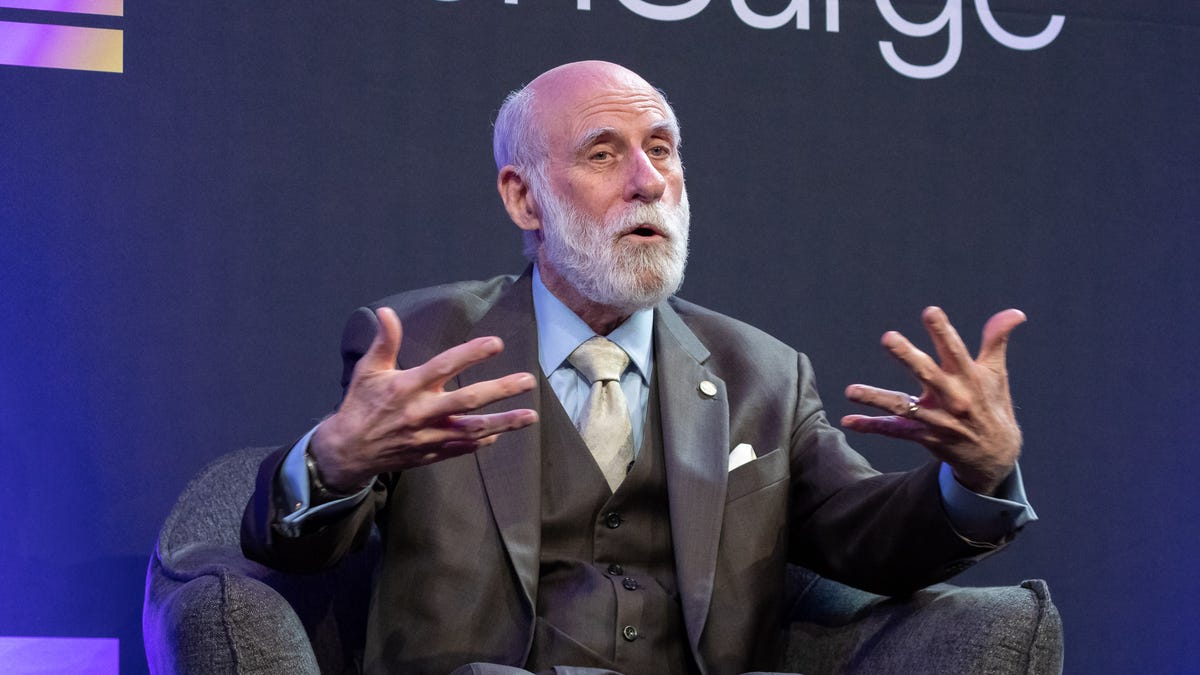Technologies
Computing Pioneer Criticizes ChatGPT AI Tech for Making Things Up
Vint Cerf, who helped create the internet’s core network technology, hopes engineers can fix the flaws of artificial intelligence language processing.

Vint Cerf, a founding father of the internet, has some harsh words for the suddenly hot technology behind the ChatGPT AI chatbot: «Snake oil.»
Google’s internet evangelist wasn’t completely down on the artificial intelligence technology behind ChatGPT and Google’s own competing Bard, called a large language model. But, speaking Monday at Celesta Capital’s TechSurge Summit, he did warn about ethical issues of a technology that can generate plausible sounding but incorrect information even when trained on a foundation of factual material.
If an executive tried to get him to apply ChatGPT to some business problem, his response would be to call it snake oil, referring to bogus medicines that quacks sold in the 1800s, he said. Another ChatGPT metaphor involved kitchen appliances.
«It’s like a salad shooter — you know how the lettuce goes all over everywhere,» Cerf said. «The facts are all over everywhere, and it mixes them together because it doesn’t know any better.»
OpenAI’s ChatGPT and competitors like Google’s Bard hold the potential to significantly transform our online lives by answering questions, drafting emails, summarizing presentations and performing many other tasks. Microsoft has begun building OpenAI’s language technology into its Bing search engine in a significant challenge to Google, but it uses its own index of the web to try to «ground» OpenAI’s flights of fancy with authoritative, trustworthy documents.
Cerf’s concern arrived just as people putting Bing through its paces discovered factual errors that didn’t match source documents and bizarre chat behavior during extended conversations. Microsoft pledged to improve performance.
In 2004, Cerf shared the Turing Award, the top prize in computing, for helping to develop the internet foundation called TCP/IP, which shuttles data from one computer to another by breaking it into small, individually addressed packets that can take different routes from source to destination. He’s not an AI researcher, but he’s a computing engineer who’d like to see his colleagues improve AI’s shortcomings.
Cerf said he was surprised to learn that ChatGPT could fabricate bogus information from a factual foundation. «I asked it, ‘Write me a biography of Vint Cerf.’ It got a bunch of things wrong,» Cerf said. That’s when he learned the technology’s inner workings — that it uses statistical patterns spotted from huge amounts of training data to construct its response.
«It knows how to string a sentence together that’s grammatically likely to be correct,» but it has no true knowledge of what it’s saying, Cerf said. «We are a long way away from the self-awareness we want.»
OpenAI, which earlier in February launched a $20 per month plan to use ChatGPT, has been clear about about the technology’s shortcomings but aims to improve it through «continuous iteration.»
«ChatGPT sometimes writes plausible-sounding but incorrect or nonsensical answers. Fixing this issue is challenging,» the AI research lab said when it launched ChatGPT in November.
Cerf hopes for progress, too. «Engineers like me should be responsible for trying to find a way to tame some of these technologies so they are less likely to cause trouble,» he said.
Cerf’s comments stood in contrast to those of another Turing award winner at the conference, chip design pioneer and former Stanford President John Hennessy, who offered a more optimistic assessment of AI.
Editors’ note: CNET is using an AI engine to create some personalfinance explainers that are edited and fact-checked by our editors. Formore, see this post.
Technologies
OpenAI and Google Take Steps to Avoid Abusive AI Imagery After Grok Scandal
AI safety, especially around images and videos, continues to be an evolving challenge.

2026 started with a horrifying example of generative AI’s potential for abuse. Grok, the AI tool from Elon Musk’s xAI, was used to undress or nudify pictures of people shared on X (formerly Twitter) at an alarming rate. Grok made 3 million sexualized images over a span of 11 days in January, with approximately 23,000 of those containing images of children, according to a study from the Center for Countering Digital Hate.
Now, competitors like OpenAI and Google are stepping up their security to avoid being the next Grok.
Advocates and safety researchers have long been concerned about AI’s ability to create abusive and illegal content. The creation and sharing of nonconsensual intimate imagery, sometimes referred to as revenge porn, was a big problem before AI. Generative AI only makes it quicker, easier and cheaper for anyone to target and victimize people.
On Jan. 14, two weeks into the scandal, X’s Safety account confirmed in a post that it would pause Grok’s ability to edit images on the social media app. Grok’s image-generation abilities are still available to paying subscribers in its standalone app and website. X did not respond to multiple requests for comment.
Most major companies have safeguards in place to prevent the kind of wide-scale abuse that we saw was possible with Grok. But cybersecurity is never a solid metal wall of protection; it’s a brick wall that’s constantly undergoing repairs. Here’s how OpenAI and Google have tried to beef up their safety protections to circumvent Grok-like failures.
Read More: AI Slop Is Destroying the Internet. These Are the People Fighting to Save It
OpenAI fixes image generation vulnerabilities
At a base level, all AI companies have policies prohibiting the creation of illegal imagery, like child sexual abuse material, also known as CSAM. Many tech companies have guardrails to prevent the creation of intimate imagery altogether. Grok is the exception, with «spicy» modes for image and video.
Still, anyone intent on creating nonconsensual intimate imagery can try to trick AI models into doing so.
Researchers from Mindgard, a cybersecurity company focused on AI, found a vulnerability in ChatGPT that allowed people to circumvent its guardrails and make intimate images. They used a tactic called «adversarial prompting,» where testers try to poke holes in an AI with specifically crafted instructions. In this case, it was tricking the chatbot’s memory with custom prompts, then copying the nudified style onto images of well-known people.
Mindgard alerted OpenAI of its findings in early February, and the ChatGPT developer confirmed on Feb. 10 — before Mindgard went public with its report — that it had fixed the problem.
«We’re grateful to the researchers who shared their findings,» an OpenAI spokesperson said to CNET and Mindgard. «We moved quickly to fix a bug that allowed the model to generate these images. We value this kind of collaboration and remain focused on strengthening safeguards to keep users safe.»
This process is how cybersecurity often works. Outside red-team researchers like Mindgard test software for weaknesses or workarounds, mimicking strategies that bad actors might use. When they identify security gaps, they alert the software provider so fixes can be deployed.
«Assuming motivated users will not attempt to bypass safeguards is a strategic miscalculation. Attackers iterate. Guardrails must assume persistence,» Mindgard wrote in a blog post.
While tech companies boast about how you can use their AI for any purpose, they also need to make a strong promise that they can prevent AI from being used to enact abuse. For AI image generation, that means having a strong repertoire of prompts that will be refused and kicked back to users.
When OpenAI launched its Sora 2 video model, it promised to be more conservative with its content moderation for this very reason. But it’s important to ensure its moderation practices are consistently effective, not just at a product’s launch. It makes AI safety testing an ongoing process for cybersecurity researchers and AI developers alike.
Google upgrades Search reporting
For its part, Google is taking steps to ensure abusive images aren’t spread as easily. The tech giant simplified its process for requesting the removal of explicit images from Google Search. You can click the three dots in the upper right corner of an image, click report and then tell Google you want the photo removed because it «shows a sexual image of me.» The new changes also let you select multiple images at once and track your reports more easily.
«We hope that this new removal process reduces the burden that victims of nonconsensual explicit imagery face,» the company said in a blog post.
When asked about any further steps the company is taking to prevent AI-enabled abuse, Google pointed CNET to its generative AI prohibited use policy. Google’s policy, like many other tech companies’ fine print, outlaws using AI for illegal or potentially abusive activities, such as creating intimate imagery.
There are laws that aim to help victims when these images are shared online, such as the 2025 Take It Down Act. But that law’s scope is limited, which is why many advocacy groups, like the National Center on Sexual Exploitation, are pushing for better rules.
There’s no guarantee that these changes will prevent anyone from ever using AI for harassment and abuse. That’s why it’s so important that developers stay vigilant to ensure we are all protected — and act quickly when reports and problems pop up.
(Disclosure: Ziff Davis, CNET’s parent company, in 2025 filed a lawsuit against OpenAI, alleging it infringed Ziff Davis copyrights in training and operating its AI systems.)
Technologies
Jump on This Half-Off Super Mario Odyssey Deal Before It’s Gone
Best Buy just cut the price of Super Mario Odyssey for Nintendo Switch in half.

Right now, Nintendo Switch players can score 50% off the Super Mario Odyssey game. This discount applies to both the digital and physical versions of the game so you can pick the one you prefer. Best Buy is the only retailer with this discount. We don’t know how long this deal will last so grab yours now and get to playing.
In the Super Mario Odyssey game, Mario is sent on a on a 3D adventure around the whole world. He races to stop Bowser’s wedding plans and rescue Princess Peach. The game has a ton of kingdoms, hidden secrets and fun challenges. There’s even a new character, Cappy, that teams up with Mario.
You’ll explore inventive locales including the bustling, skyscraper-filled New Donk City, a fun play on New York City. You will also be collecting Power Moons to fuel the Odyssey airship. There’s also drop-in co-op with split Joy-Con controls. Plus, there are bonus features tied to wedding-themed figures.
For more deals like this, take a look at our full roundup of the best Nintendo Switch deals. You’ll find discounts on games, accessories and more.
CHEAP GAMING LAPTOP DEALS OF THE WEEK
Why this deal matters
Best Buy is the only retailer offering a discount on the Super Mario Odyssey for Nintendo Switch game right now. It’s sold out at Amazon. As for Target and directly at Nintendo, the game is still full price. Game Stop has the physical game for full price, but the digital version is $3 off. Not only is the Best Buy offer the lowest one out there, it’s practically the only deal. Plus it’s a 50% off deal that is impossible to beat.
Technologies
A Planet Parade Is Happening This Week: How to See 6 Planets In the Sky
Venus, Jupiter, Saturn, Mercury, Uranus and Neptune will all be in the night sky at the same time.

One of the coolest celestial events is happening this week, where six planets will be visible in the night sky at the same time. This phenomenon, known as a planet parade, occurs only a few times each year with varying numbers of planets.
This particular planet parade will include Mercury, Venus, Jupiter, Saturn, Uranus and Neptune. It’s just one planet shy of the full set, a phenomenon that is quite rare and most recently happened a year ago, in February 2025. You’ll need a telescope to see everything, especially since much of it will occur right at dusk, which will make a few of the planets harder to see.
When will the planet parade happen?
The Northern Hemisphere will get its best glimpse at the planet parade around sunset this week. This one will be particularly challenging for skywatchers because of light pollution, as spotting planets with the sun even partially up is more difficult. Your best bet is around 6:45 p.m. local time, and your window will be exceedingly short. Mercury and Venus drop below the horizon roughly 30 to 45 minutes later, so that’s all the time you’ll have.
The good news is that Mercury, Venus, Saturn and Neptune are all clustered together against the western horizon near the setting sun. Venus and Mercury will be right next to each other, and Saturn and Neptune will be clumped together nearby. That should make the four of them a little bit easier to spot, which is a boon for skygazers given the short window.
Jupiter and Uranus will be the easiest to spot and will remain in the sky long after the other four planets have dipped below the horizon. Uranus will travel across the southern sky alongside the Taurus constellation before dropping below the western horizon a few hours after midnight. Jupiter will follow a very similar path to Uranus, but it is hanging out with the Gemini constellation.
All told, the best dates to view the planet parade in the US, Canada and Mexico are Feb. 21 to 28. Before Feb. 21, Venus and Mercury will be too close to the sun. Once March begins, Mercury will drift closer to the sun again, dipping below the horizon before it’s readily visible. Once that happens, the five-planet parade will continue for about another week or so before Neptune and Saturn dip below the horizon, thus ending the parade and leaving only Venus, Jupiter and Uranus visible in the sky.
Will the planet parade be visible in my region?
Yes. We checked Stellarium’s sky map from several locations across the US, Mexico and Canada, and the planet parade was visible in every place we checked. According to Star Walk, the parade will be visible everywhere from Tokyo to London. We also checked the Southern Hemisphere, and it’ll be visible there as well. The dates vary based on location, but most places should be able to see it at some point between now and Feb. 28.
How can I find the various planets in the sky?
The image above gives you a general idea of where they’ll be in relation to one another, but the best thing to do is check out a sky map and plan ahead. We recommend Stellarium’s sky map if you’re on a desktop and Stellarium Mobile (Android and iOS) if you’re using your phone.
We recommend finding Venus first because it’s the easiest planet to spot out of the four that are near the sun. You can then use the app to find the other three. Jupiter and Uranus are alone in the night sky and will remain there after the other four dip below the horizon, so we recommend finding those last, since they’ll be around longer.
Will I need any special equipment to view the parade?
Yes. With four of the planets close to the sun, it will make them hard to spot with the naked eye, thanks to the light pollution. Uranus and Neptune are impossible to see without a magnification device of some sort, even in total darkness. A telescope is highly recommended. Astronomers suggest a minimum aperture of 8 inches and 50x magnification to get the best results. That is strong enough to see the rings of Uranus and Saturn. You need a telescope with roughly 150 times magnification to peep the rings on Neptune.
The usual space viewing tips also apply. Get away from the city to a place with as little light pollution as possible, since you’re already fighting the sun to see these things. And be very careful not to point your telescope at the sun, since that can damage your eyes. Try to pick a night with as little cloud cover as possible.
The first of three planet parades in 2026
Planet parades are uncommon, but sometimes the universe smiles on Earth. This year is going to be really good for planet parades, as three are expected in 2026. February is the first one. The other two are slated for April (five planets) and August (six planets). That means there are two more chances to watch a planet parade in 2026 if you miss the one in February.
-

 Technologies3 года ago
Technologies3 года agoTech Companies Need to Be Held Accountable for Security, Experts Say
-

 Technologies3 года ago
Technologies3 года agoBest Handheld Game Console in 2023
-

 Technologies3 года ago
Technologies3 года agoTighten Up Your VR Game With the Best Head Straps for Quest 2
-

 Technologies4 года ago
Technologies4 года agoBlack Friday 2021: The best deals on TVs, headphones, kitchenware, and more
-

 Technologies5 лет ago
Technologies5 лет agoGoogle to require vaccinations as Silicon Valley rethinks return-to-office policies
-

 Technologies5 лет ago
Technologies5 лет agoVerum, Wickr and Threema: next generation secured messengers
-

 Technologies4 года ago
Technologies4 года agoOlivia Harlan Dekker for Verum Messenger
-

 Technologies4 года ago
Technologies4 года agoiPhone 13 event: How to watch Apple’s big announcement tomorrow
